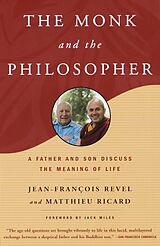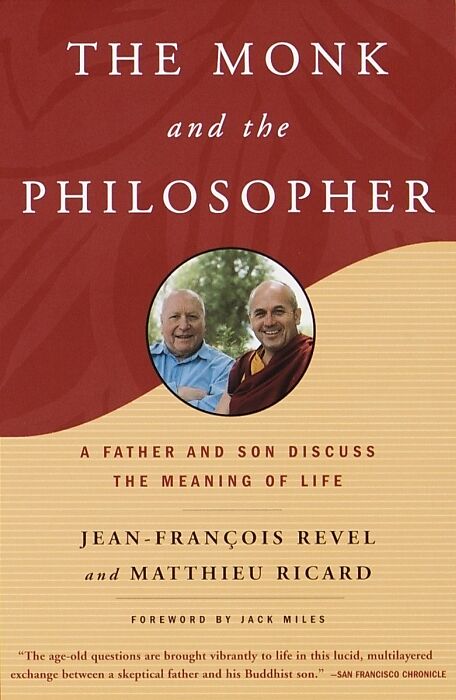The Monk and the Philosopher
Einband:
Poche format B
EAN:
9780805211030
Untertitel:
A Father and Son Discuss the Meaning of Life
Genre:
Sozialwissenschaften, Recht & Wirtschaft
Autor:
Jean-Francois; Ricard, Matthieu Revel
Herausgeber:
SCHOCKEN BOOKS INC
Anzahl Seiten:
351
Erscheinungsdatum:
15.02.2000
ISBN:
0805211039
Zusatztext "The wonderful thing about this book is that it shows how fruitful open-hearted dialogue can be. Although these two men have pursued their humane concerns and their quest for knowledge by different means! I believe they both reveal that it's not so important whether life has meaning! but whether we give meaning to the life we live." -- His Holiness The Dalai Lama "The Monk and the Philosopher is an intellectual banquet -- an enlightening and lively encounter that explores man-kind's most profound questions." -- Daniel Goleman! author of Emotional Intelligence Informationen zum Autor Jean-Francois Revel, a member of the Academie Francaise, was born in 1924. He studied and taught philosophy but abandoned university teaching to concentrate on writing. He was editor for many years of the influential political weekly L'Express. His books, including the best-seller Without Marx or Jesus and How Democracies Perish , have gained worldwide recognition. Matthieu Ricard lives in the Shechen Monastery in Nepal. Born in France in 1946, he received his doctorate in molecular biology from the Institut Pasteur in Paris. In 1972 he decided to forsake his scientific career to better concentrate on his Buddhist studies, which he had begun years earlier. He has published Journey to Enlightenment , a book of photographs about his teacher, Dilgo Khyentse Rinpoche (one of the most eminent Tibetan masters of our times and a teacher to The Dalai Lama), as well as translations of many Buddhist texts. He often accompanies The Dalai Lama to France as his personal interpreter. Klappentext Jean Francois-Revel, a pillar of French intellectual life in our time, became world famous for his challenges to both Communism and Christianity. Twenty-seven years ago, his son, Matthieu Ricard, gave up a promising career as a scientist to study Tibetan Buddhism -- not as a detached observer but by immersing himself in its practice under the guidance of its greatest living masters. Meeting in an inn overlooking Katmandu, these two profoundly thoughtful men explored the questions that have occupied humankind throughout its history. Does life have meaning? What is consciousness? Is man free? What is the value of scientific and material progress? Why is there suffering, war, and hatred? Their conversation is not merely abstract: they ask each other questions about ethics, rights, and responsibilities, about knowledge and belief, and they discuss frankly the differences in the way each has tried to make sense of his life. Utterly absorbing, inspiring, and accessible, this remarkable dialogue engages East with West, ideas with life, and science with the humanities, providing wisdom on how to enrich the way we live our lives.Jean Francois-- So let's come back to the question, is Buddhism a philosophy or a religion? Or philosophy and religion? What strikes me is this. Buddhism, on the whole, has a very positive image in the West. It's true that right now people's feelings toward Buddhism are reinforced by the sympathy they feel toward the Tibetans, with all the sufferings they are going through, and also by the impact the Dalai Lama's personality has had worldwide and the affection--and even veneration--that he arouses everywhere, even in parts of the world unfamiliar with Buddhism. But quite apart from that recent political limelight, Buddhism has been treated with considerable respect in the West for a long time. It's always been seen as a rather unadulterated and straightforward doctrine that can therefore be accepted by a critical mind. It fits with Western rationalism, to which it adds a moral and spiritual dimension--a dimension of wisdom, or even more, not incompatible with criteria that have been evolving in the West with the modern scientific outlook since the Enlightenment and eighteenth-century rationalism. But when you come to Asia, that ethereal vision of Buddhi...
Autorentext
Jean-Francois Revel, a member of the Academie Francaise, was born in 1924. He studied and taught philosophy but abandoned university teaching to concentrate on writing. He was editor for many years of the influential political weekly L'Express. His books, including the best-seller Without Marx or Jesus and How Democracies Perish, have gained worldwide recognition.
Matthieu Ricard lives in the Shechen Monastery in Nepal. Born in France in 1946, he received his doctorate in molecular biology from the Institut Pasteur in Paris. In 1972 he decided to forsake his scientific career to better concentrate on his Buddhist studies, which he had begun years earlier. He has published Journey to Enlightenment, a book of photographs about his teacher, Dilgo Khyentse Rinpoche (one of the most eminent Tibetan masters of our times and a teacher to The Dalai Lama), as well as translations of many Buddhist texts. He often accompanies The Dalai Lama to France as his personal interpreter.
Klappentext
Jean Francois-Revel, a pillar of French intellectual life in our time, became world famous for his challenges to both Communism and Christianity. Twenty-seven years ago, his son, Matthieu Ricard, gave up a promising career as a scientist to study Tibetan Buddhism -- not as a detached observer but by immersing himself in its practice under the guidance of its greatest living masters.
Meeting in an inn overlooking Katmandu, these two profoundly thoughtful men explored the questions that have occupied humankind throughout its history. Does life have meaning? What is consciousness? Is man free? What is the value of scientific and material progress? Why is there suffering, war, and hatred? Their conversation is not merely abstract: they ask each other questions about ethics, rights, and responsibilities, about knowledge and belief, and they discuss frankly the differences in the way each has tried to make sense of his life.
Utterly absorbing, inspiring, and accessible, this remarkable dialogue engages East with West, ideas with life, and science with the humanities, providing wisdom on how to enrich the way we live our lives.
Leseprobe
Jean Francois-- So let's come back to the question, is Buddhism a philosophy or a religion? Or philosophy and religion? What strikes me is this. Buddhism, on the whole, has a very positive image in the West. It's true that right now people's feelings toward Buddhism are reinforced by the sympathy they feel toward the Tibetans, with all the sufferings they are going through, and also by the impact the Dalai Lama's personality has had worldwide and the affection--and even veneration--that he arouses everywhere, even in parts of the world unfamiliar with Buddhism. But quite apart from that recent political limelight, Buddhism has been treated with considerable respect in the West for a long time. It's always been seen as a rather unadulterated and straightforward doctrine that can therefore be accepted by a critical mind. It fits with Western rationalism, to which it adds a moral and spiritual dimension--a dimension of wisdom, or even more, not incompatible with criteria that have been evolving in the West with the modern scientific outlook since the Enlightenment and eighteenth-century rationalism. But when you come to Asia, that ethereal vision of Buddhism is put to the severest of tests. Someone like me is struck, or perhaps I should say shocked, by many aspects of the way Buddhism is practiced that I can only qualify as superstitious. Prayer flags, prayer wheels, belief in reincarnation -- like that three-year old we met the other day who's supposed to be a reincarnated lama.
Matthiew-- Yes, the whole idea of reincarnation, especially, is something we'll need to talk about to clarify. But first, let's go through your points in order. I think the main reason Buddhism has been seen in the West as so intellectually acceptable is that it tackles the basic concerns of any living being. The…

Leider konnten wir für diesen Artikel keine Preise ermitteln ...
billigbuch.ch sucht jetzt für Sie die besten Angebote ...
Die aktuellen Verkaufspreise von 6 Onlineshops werden in Realtime abgefragt.
Sie können das gewünschte Produkt anschliessend direkt beim Anbieter Ihrer Wahl bestellen.
Loading...
Die aktuellen Verkaufspreise von 6 Onlineshops werden in Realtime abgefragt.
Sie können das gewünschte Produkt anschliessend direkt beim Anbieter Ihrer Wahl bestellen.
| # | Onlineshop | Preis CHF | Versand CHF | Total CHF | ||
|---|---|---|---|---|---|---|
| 1 | Seller | 0.00 | 0.00 | 0.00 |
